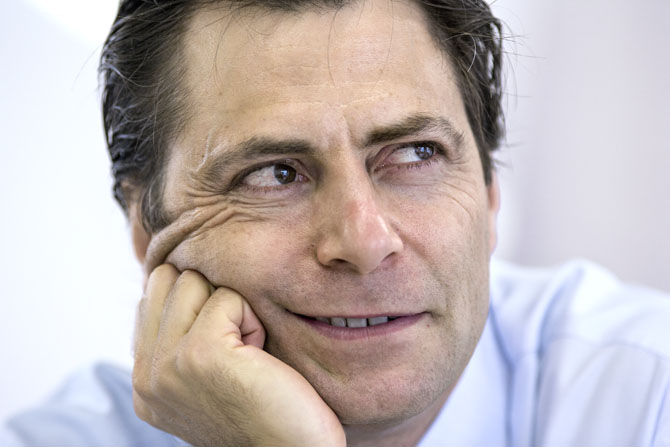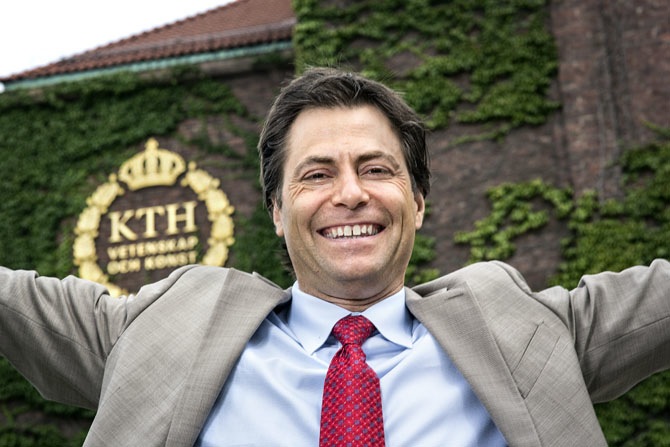
Great Prize winner Tegmark reflects on life and technology
Great Prize
What is reality? It is a question perhaps too metaphysical to possibly answer. But to cosmologist Max Tegmark there are no oddities, only probabilities. In his search for answers, he decided that mathematics is the basis upon which the universe rests, and which the universe is made up of.
"One of the most important insights of physics is that nothing is what it seems," Tegmark discloses, in passing.
Tegmark arrives for his interview right after flying in from Boston, but he appears unruffled. It is in the middle of the Swedish summer and he is about to start a weeklong vacation from his job as professor of theoretical physics at Massachusetts Institute of Technology (MIT). He'll spent part of his summer break in the rural western Swedish county of Dalarna.
A former KTH student in the late 1980s, Tegmark appears at home on the KTH campus — even if it's in the newly-opened Openlab cafe, where we meet over a cup of coffee.
"This is where the President's office used to be, right?" he says. "Sing Sing is probably my favorite place, anyway. That's where I hung out most when I studied."
He started out at KTH as an economics student, but Tegmark discovered physics after one year — quite by chance, it seems. He borrowed the book, "Surely you're joking, Mr. Feynman", which was written by the theoretical physicist and Nobel laureate Richard Feynman.
"I must have missed something, I thought. Economics in all its glory; but physics opened up a greater perspective."

In Tegmark's frame of reference, perspective is crucial. Given that our universe has existed for nearly 14 billion years since the big bang, the question of what is long term and short term is highly relative.
"It has taken us such a long time to achieve the knowledge we have today, and we now stand at a crossroads. Should we manage and develop the knowledge or wipe out our civilization?"
With research, human knowledge has evolved radically in pace with time. We know much more today than we did 1,000 — or even 30 years — ago. We can map and analyze atoms, which make up 5 percent of the mass of the universe — but the rest we know very little about.
The Earth is not flat, the universe consists of infinitely more than we had originally thought. The sun is not the only star that has a solar system. But what do we not yet know and see? What is not yet understood? It's easy to become fixed upon the present, with the hubris and belief that in our time we have the technology, the knowledge and the solution to mankind's problems.
"Throughout time there is a race between technology and the wisdom on how we should make use of the technology. We do not give bombs to kindergarten children. As researchers we have a great responsibility, and we face one of the most important choices since the universe awoke."
Tegmark is an optimist, and a founder of the Future of Life Institute (http://futureoflife.org), which aims, among other things, at curbing the use of technology for the good of humanity.
"I definitely think that we can create a better world; but it requires focus, hard work and that we do not botch it. Sometimes technology can seem like a new religion with the solution to everything, but it is not that simple."
Humility is something Tegmark returns to. Both in his research quest, and in his book that came last year, "Our mathematical universe - my search for the ultimate reality."
Our galaxy is just one in a series of a perhaps endless numbers of galaxies. Our universe caused the big bang. Like a cell dividing, it began to grow and divide exponentially at a furious pace.
"Reality is much larger than we previously imagined, and we are significantly smaller."
Tegmark, however, has a solid foundation to stand on — namely mathematics, which he says not only describes our universe but constitutes its very structure. Everything in the universe is mathematical, according to him. Beyond ours, there is likely an endless series of parallel worlds, like a long row of copies of both the universe and ourselves.
You never get vertigo?
"Well, of course, but the boundless is also incredibly fascinating," he says, and emphasizes that his is not some sort of philosophical idea. Rather, it is about theoretical models of mathematical equations that can be tested in this reality.
The ideas of parallel universes are one part of Tegmark's research, while on the other hand he investigates the physics of intelligence, and how brain networks operate.
"To try to understand the structure of human consciousness is very exciting."
An ideal workday for Tegmark begins with a bicycle ride past the three lakes to the university's Cambridge campus. He tries to concentrate on one thing at a time and keep his own focus. He prefers to work at home and refrains from checking his email until midday.
I'm trying to compress the little things as much as possible and not let the noise to take over. I read email in the gaps. I can never work really concentrated on the job."
In our universe, the professor takes a quick snooze before the next meeting. In all the others, he is probably doing something else.
Jill Klackenberg

